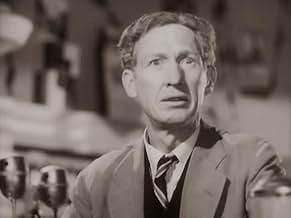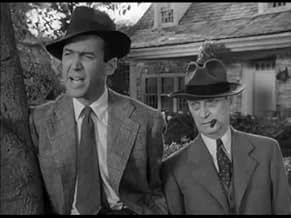IMDb RATING
6.4/10
1.9K
YOUR RATING
An opinion pollster finds a town which is a perfect mirror of U.S. opinions.An opinion pollster finds a town which is a perfect mirror of U.S. opinions.An opinion pollster finds a town which is a perfect mirror of U.S. opinions.
- Awards
- 1 win total
Featured reviews
A year before this film came out there were major news stories about a `perfect American city,' but once the story broke
so did the illusion. People had to learn the perfect society has to be practiced individually, intentionally and daily for it to become a reality.
I just re-watched this film again today and was very entertained by James Stewart (winking and charming) and Jane Wyman (smart and sexy). Packed with the Robert Riskin type characters this story lacks the `real' message of his earlier films and there in lies it's only weakness. It's a fun trip but after we've gone in circles for a while we are reminded there is no place like home. Still this film has lots of treasures in the performances, dialogue, physical comedy and rich diversity home spun Americana characters. I recommend this to all fans of the Capra-Riskin genre.
P.S. It's also your last chance to enjoy the work of Ned Sparks & Donald Meek who both died after completing this minor masterpiece of Riskin-corn.
I just re-watched this film again today and was very entertained by James Stewart (winking and charming) and Jane Wyman (smart and sexy). Packed with the Robert Riskin type characters this story lacks the `real' message of his earlier films and there in lies it's only weakness. It's a fun trip but after we've gone in circles for a while we are reminded there is no place like home. Still this film has lots of treasures in the performances, dialogue, physical comedy and rich diversity home spun Americana characters. I recommend this to all fans of the Capra-Riskin genre.
P.S. It's also your last chance to enjoy the work of Ned Sparks & Donald Meek who both died after completing this minor masterpiece of Riskin-corn.
Written and produced by frequent Frank Capra collaborator Robert Riskin and starring the director's three-time leading man James Stewart, one would be excused for mistaking this for a film by the celebrated purveyor of socially-conscious comedies.
However, while the plot is typically original and engaging, somehow it lacks Capra's unique cinematic expertise in putting over Riskin's ideas: the tone is too often syrupy and sentimental, while the hero isn't made to face formidable villains such as one finds in Capra's work. Even if director Wellman was more at home in outdoor actioners, he often displayed a social side and, for the record, had previously triumphed in two classic films set in contemporary times namely the original version of A STAR IS BORN and the screwball comedy NOTHING SACRED (1937).
Stewart is a poll expert who believes that one city in the U.S. could be deemed the reference point as to how the whole nation thinks and feels about all aspects of life its aspirations, trends, political views, etc. His report leads him to settle on the small Midwestern town of Grandview which, however, is on the point of modernizing itself (via a project bequeathed to local reporter Jane Wyman by her father). This would, doubtless, affect the idealized image being promoted by Stewart of Grandview as the prototypical American town with its simple way of life, so he manipulates the populace (without letting them on to his line of work) into opposing Wyman's scheme! This doesn't prevent the two from falling in love a romance which ends, though, when she overhears him speaking to his superior in New York; distraught, she exposes his racket but, in so doing, brings a whole circus of 'prospectors' and newshounds upon Grandview so that the next poll turns out to be a disaster, and the town is disgraced!
Stewart is dismayed by all of this; however, he keeps in touch with the people of Grandview (the kids especially had learned to look up to him in view of his basketball prowess!) and, of course, Wyman. Eventually, he hits upon the idea that a pompous statement made earlier (but which remained unpublished) by the highest authorities in Grandview that, if necessary, they'll erect the proposed civic centre with their own hands could be used now to symbolize the town's determination to re-emerge An RKO production, the film also features such reliable performers as Ned Sparks and Donald Meek as Stewart's associates, Kent Smith as a Grandview professor and ex-school chum of Stewart's, and Wallace Ford as one of the eminent townspeople.
However, while the plot is typically original and engaging, somehow it lacks Capra's unique cinematic expertise in putting over Riskin's ideas: the tone is too often syrupy and sentimental, while the hero isn't made to face formidable villains such as one finds in Capra's work. Even if director Wellman was more at home in outdoor actioners, he often displayed a social side and, for the record, had previously triumphed in two classic films set in contemporary times namely the original version of A STAR IS BORN and the screwball comedy NOTHING SACRED (1937).
Stewart is a poll expert who believes that one city in the U.S. could be deemed the reference point as to how the whole nation thinks and feels about all aspects of life its aspirations, trends, political views, etc. His report leads him to settle on the small Midwestern town of Grandview which, however, is on the point of modernizing itself (via a project bequeathed to local reporter Jane Wyman by her father). This would, doubtless, affect the idealized image being promoted by Stewart of Grandview as the prototypical American town with its simple way of life, so he manipulates the populace (without letting them on to his line of work) into opposing Wyman's scheme! This doesn't prevent the two from falling in love a romance which ends, though, when she overhears him speaking to his superior in New York; distraught, she exposes his racket but, in so doing, brings a whole circus of 'prospectors' and newshounds upon Grandview so that the next poll turns out to be a disaster, and the town is disgraced!
Stewart is dismayed by all of this; however, he keeps in touch with the people of Grandview (the kids especially had learned to look up to him in view of his basketball prowess!) and, of course, Wyman. Eventually, he hits upon the idea that a pompous statement made earlier (but which remained unpublished) by the highest authorities in Grandview that, if necessary, they'll erect the proposed civic centre with their own hands could be used now to symbolize the town's determination to re-emerge An RKO production, the film also features such reliable performers as Ned Sparks and Donald Meek as Stewart's associates, Kent Smith as a Grandview professor and ex-school chum of Stewart's, and Wallace Ford as one of the eminent townspeople.
Okay, I'll admit the plot is silly and contrived. Sure, the idea of an actuary determining that there is a "perfect" city that is actually statistically represents America in a microcosm is silly. And, their plan NOT to tell anyone in the town but surreptitiously poll just these townspeople in order to find out what America thinks about a wide variety of issues is far-fetched. BUT, with Jimmy Stewart and Jane Wyman as well as William Wellman's direction, who cares?! This is one of those "just sit back and enjoy" pictures that isn't particularly deep but that is charming and great fun to watch. And I think we need a few films like this now and again.
James Stewart stars as Rip Smith, a leading pioneer in the new sciences of public polling and demography. He discovers a small town that serves as a microcosm of the US, with the same percentages of men to women, farmers to shop-keepers, Democrats to Republicans, etc. Etc. This means that Rip and his two associates Ike (Ned Sparks) and Mr. Twiddle (Donald Meek) can survey this one town and get the same results as if they's polled the whole nation, saving companies vast amounts of time and money. However, to keep the townsfolk's answers honest, the trio of newcomers pose as insurance salesmen. Rip also falls for local gal Mary (Jane Wyman), but how will she and the others react when they learn the truth of why Rip's in town?
This was made during a time when the new advances in sociology, group psychology, and by extension Madison Avenue's advertising firms, were thought be on the pulse of the future of the nation. This kind of thinking could make for a thoughtful movie with the right script, but this isn't it. This is a traditional rom-com mixed with lukewarm social commentary and square citizenship lessons. Stewart and Wyman are both fine, as usual, and I liked seeing Ned Sparks, one of the busier character actors of the 1930's, acting wry and cynical again. This would be Sparks last film, as it would be for Harry Holman and Donald Meek, too. Director William Wellman keeps things moving quickly enough, but no one would consider this one of the better films by anyone involved.
This was made during a time when the new advances in sociology, group psychology, and by extension Madison Avenue's advertising firms, were thought be on the pulse of the future of the nation. This kind of thinking could make for a thoughtful movie with the right script, but this isn't it. This is a traditional rom-com mixed with lukewarm social commentary and square citizenship lessons. Stewart and Wyman are both fine, as usual, and I liked seeing Ned Sparks, one of the busier character actors of the 1930's, acting wry and cynical again. This would be Sparks last film, as it would be for Harry Holman and Donald Meek, too. Director William Wellman keeps things moving quickly enough, but no one would consider this one of the better films by anyone involved.
"Magic Town" is a film about something that we nowadays take as normal but which was a novelty in 1947. It was about the new "science" of public opinion polling. This was only understood poorly and not only by the public but by those who actually mattered: the politicians who would grow to need them. In 1936 the Literary Digest, a popular magazine of the day, had conducted a poll of it's membership on who would win the Presidency. It concluded that Governor Alfred Landon of Kansas, a capable man, would beat incumbent President Franklin Roosevelt. Unfortunately the readership of the Digest were upper class, and basically Republican (as Landon was). In November 1936 FDR won one of the biggest landslides in political history, with three quarters of the popular vote and all the electoral votes except for those of Maine and Vermont. Literary Digest went out of business shortly afterwords. In the decade since Roper and Gallup had been improving polling techniques, but the full system was still uncertain. In the 1948 election there would be another polling snafu, with most of the polls awarding the election to Governor Thomas Dewey of New York, as opposed to incumbent President Harry Truman. Harry won a remarkable come-from-behind over Tom, and enjoyed showing off a headline from the Republican "Chicago Tribune" saying that Tom won.
In the midst of all this there was a classic sociology study entitled "Middletown". Set in the typical mid-American town (it was in the Midwest) the authors (a husband and wife team) showed how it's citizens opinions mirrored what mid-America believed. Ten years later the same authors published a follow up study of the town, and it turned there was little change in the opinion differentials between the town and the country.
It is with the "Middletown" study that the background of this film was based. Jimmy Stewart and his assistants (including Ned Sparks and Donald Meek - in his last role) are pollsters, and Stewart has a theory he has been working on that would save pollsters millions. He believes there is a perfect community in the middle of America that can be used for polling it's citizens. He has been studying the problem for several years, and he has found a town where the percentages of the opinions of the citizens perfectly mirror those of the American people as a whole. Stewart goes to the town and sets up there with the intention of using the citizens as his poling guinea pigs, but (as the movie progresses) he gets involved with Jane Wyman and the others in the town. When Wyman discovers Stewart's plans she reveals them, and the town goes crazy. Their sudden unofficial power goes to their heads, and instead of giving the sensible polling answers to questions they give outlandish ones. This causes the crash of their reputation, and the crisis of the film.
It is a first rate film and has some nice touches (including Gabriel Heater intoning on the radio). As an early story regarding the polling industry it is unique, and the film is well acted and directed (by William Wellman). Perhaps not a Capra movie, but it is a nice one all the same.
In the midst of all this there was a classic sociology study entitled "Middletown". Set in the typical mid-American town (it was in the Midwest) the authors (a husband and wife team) showed how it's citizens opinions mirrored what mid-America believed. Ten years later the same authors published a follow up study of the town, and it turned there was little change in the opinion differentials between the town and the country.
It is with the "Middletown" study that the background of this film was based. Jimmy Stewart and his assistants (including Ned Sparks and Donald Meek - in his last role) are pollsters, and Stewart has a theory he has been working on that would save pollsters millions. He believes there is a perfect community in the middle of America that can be used for polling it's citizens. He has been studying the problem for several years, and he has found a town where the percentages of the opinions of the citizens perfectly mirror those of the American people as a whole. Stewart goes to the town and sets up there with the intention of using the citizens as his poling guinea pigs, but (as the movie progresses) he gets involved with Jane Wyman and the others in the town. When Wyman discovers Stewart's plans she reveals them, and the town goes crazy. Their sudden unofficial power goes to their heads, and instead of giving the sensible polling answers to questions they give outlandish ones. This causes the crash of their reputation, and the crisis of the film.
It is a first rate film and has some nice touches (including Gabriel Heater intoning on the radio). As an early story regarding the polling industry it is unique, and the film is well acted and directed (by William Wellman). Perhaps not a Capra movie, but it is a nice one all the same.
Did you know
- GoofsAt the soda fountain, between shots, the drinks are full, then half empty, then full again.
- Quotes
Mary Peterman: The air becomes charged with electricity around desperate men.
- Alternate versionsAlso available in a colorized version.
- ConnectionsFeatured in Cinéma de minuit: La cité magique (2024)
- How long is Magic Town?Powered by Alexa
Details
- Runtime
- 1h 43m(103 min)
- Color
- Aspect ratio
- 1.37 : 1
Contribute to this page
Suggest an edit or add missing content

























